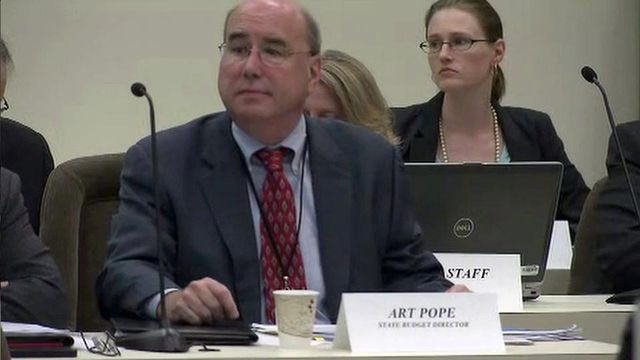Governor, senators remain divided over Medicaid
Senators say Gov. Pat McCrory's budget would set North Carolina up for a shortfall. McCrory Budget Director Art Pope says lawmakers are being too conservative and unnecessarily cutting programs.
Posted — UpdatedSenators don't trust what they see as rosy claims and enrollment backlog projections by the state. McCrory and Budget Director Art Pope don't trust the way legislative fiscal staffers have created a "worst-case scenario" that created a nearly $300 million difference in Medicaid budgets. Nobody trusts a pair of complex computer systems to produce data that can be relied upon to accurately forecast Medicaid spending for the coming year.
"We've got lousy information...There is uncertainty," Pope told lawmakers during a Senate Appropriations Committee meeting Thursday.
After going through 49 slides and spending more than two-and-a-half hours to try to win at least grudging respect for the projections put forward by his numbers, Pope continued to face skepticism.
Senators said it was that lack of good information that required them to be more conservative than the governor in their budget projections.
"It's frustrating for everyone involved," said Senate President Pro Tem Phil Berger.
Medicaid at center of budget standoff
In particular, senators project that the state will need $200 million to $300 million more than that either the House or Senate would set aside as the state's roughly $4 billion share of Medicaid. Federal tax dollars pick up another $10 billion in spending.
Although all three groups cite a lot of numbers in their argument over Medicaid spending, there are three basic ways in which the budget estimates differ:
- The enrollment backlog: A computer system known as NC FAST was supposed to quickly evaluate eligible Medicaid applicants and enroll them in the system. That computer system is not yet working as promised, so there is a difference in opinion as to the actual backlog.
- The claims backlog: A computer system known as NCTracks is supposed to pay claims made by providers who treat or provide equipment and medication to Medicaid patients. That system is not yet giving the real-time information promised by its design, meaning that budget-writers are in the dark about how much hospitals and doctors are owed for treatment provided this year.
- Medicaid growth: Medicaid spending has grown generally over the past decade, at roughly 5 percent per year according to some projections. Pope told senators that the growth rate has slowed somewhat, but senators are less sure.
"Mr. Pope, you're known far and wide as a budget guru," Sen. Jerry Tillman, R-Randolph, said during Thursday's meeting. "Your facts and figures are looked at sometimes almost as coming from above."
But, Tillman said, the budget put forward by McCrory was based on assumptions.
"Why would you gamble on a ($200 million) or $300 million deficit going into an election year?" Tillman asked.
Pope acknowledged there was a risk that the state might have to scramble to make up a possible shortfall. Then, he shifted gears, and one of the most rock-ribbed conservatives in public life made an almost emotional appeal based on the service that would need to be cut to pay for the cushion the Senate wants.
"Senator, what is the cost of over-funding Medicaid?" Pope asked. "The cost in the Senate budget is firing teacher assistants. Some 7,000 teaching assistants who serve over 239,000 children in classrooms would be fired. If you unnecessarily fire them, you can't go back and rehire them an put them back in the classroom next spring.
"The Senate has to pay for its budget by changing the Medicaid eligibility laws," he continued. "That will require ... removing 5,200 aged, blind and disabled residents form the Medicaid safety net – 1,600 of those patients with Alzheimer's or dementia currently being served in special care units."
Conflicting data offered by hospitals
One reason senators are edgy about the governor's Medicaid projections is that hospitals have given conflicting information on how much the program owes them.
Pope and his staff said that the hospitals and legislative staffers were conflating the numbers owed to the hospitals overall and the state's share of those payments. That has led some, they argued, to overestimate the potential "worst-case scenario."
That prompted Sen. Bob Rucho, R-Mecklenburg, to question North Carolina Hospital Association Executive Vice President Hugh Tilson about the administration hospital payment backlog number.
"Do you believe ($18.5 million) is sufficient to carry the cost for the accounts receivable and unprocessed claims?" Rucho asked.
Tilson replied, "I don't know the answer to that."
Rucho then challenged Tilson, asking if his association's members would be able to sign a waiver to forgo any of the costs that exceed the $18.5 million projection.
That provoked chuckles from just about everyone in the room except Tilson, who said that the association was attempting to gather information from its members as that discussion happened.
"Our interest is ensuring that number is right," Tilson said.
The committee meeting finished without a definitive conclusion. Afterward, senators said they had no talks on bridging the House-Senate differences scheduled Thursday. It's unclear what that schedule might look like.
Related Topics
• Credits
Copyright 2024 by Capitol Broadcasting Company. All rights reserved. This material may not be published, broadcast, rewritten or redistributed.






